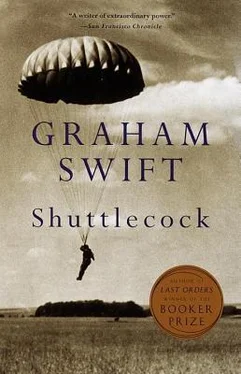‘You don’t get anything to eat until you tell me where that book is. Understand? Not tonight, not tomorrow, not — ’
‘For goodness’ sake!’ Marian said.
‘I mean what I say. Martin only has to own up.’
‘But how do you —?’
‘I know. Books don’t just disappear from shelves. Have you got a better explanation?’
About half an hour after this we had supper. I made Martin stand with his face to the wall like a naughty boy in class. I wasn’t going to give him even the partial respite of not being present while we ate. I made a point of asking for large helpings. Peter picked and spooned guiltily at his plate. Sometimes Peter is so tremulous, so mouse-like. I watched Martin. He didn’t turn his head. The backs of his thin legs beneath his shorts wobbled now and then, and I remembered the flavour of childhood punishments: the humiliation, the obscurity of adult motives; the vague feeling of outlawdom; the determination to resist. I did not expect him to own up that evening. In a strange way, I would almost have been disappointed if he had. He had had his tea, after all, and was probably too on edge at the moment to care about the loss of food. But the night would see to it. In the morning, I told myself, in the morning he will break.
At breakfast I followed the same procedure. Martin stood in the corner. He had adopted a martyrish pose which seemed to me wholly contrived. I noticed that he moved his head this time, in a quite deliberate way, as if designed for me to see, though not towards us so much as towards the front window beyond our breakfast table. It was another sunny day; between the cherry blossoms a council dust-cart was grinding down the road. Marian and I were silent with each other. I made a song and dance about enjoying my bacon and eggs. But as the minutes passed, as it drew nearer to the time when I must leave for work, I grew anxious. I knew that the boys left the house about a quarter of an hour after I did. In that quarter of an hour not only might Marian have time to shovel a hasty breakfast down Martin, but she would doubtless pack him off to school, coddled and consoled, with double rations of sandwiches. Martin knew this too. I considered whether it was worth being late to work in order not to lose the battle.
I finished my cup of coffee and got up from the table.
‘Right,’ I said. ‘Now, are you going to tell me? I don’t have to rush to work. It’s your last chance. You can turn round now.’
Martin turned. He looked ruefully for some time at his feet and then up, deliberately again, at me.
‘All right.’
‘At last! Good boy!’ I really was relieved, glad — no longer vindictive.
‘I threw it in the dustbin.’ He cocked his head towards the window. The dust-cart had departed from the street. ‘It will have gone by now.’
‘You what?’ I said, advancing across the floor. ‘You what?!’
He pressed his lips together. His face tautened.
‘That was my book!’ With a genuine woundedness in my voice. ‘That was Grandpa’s book!’
‘Grandpa — ’
He didn’t have time to say more before the first slap caught him across the face. Then another. And another. The extraordinary thing was that he didn’t turn or duck away. His feet remained firmly planted on the carpet. It was as if he had bargained all along on these blows. Tears of shock rather than fright or pain filled his eyes, but he kept his head erect and his shoulders square, like a soldier looking to the front while the sergeant screams in his ear. Even as I hit him I couldn’t help but grudgingly admire him; and it was this, rather than Marian tugging at my other arm, that made me stop.
When I did, Martin simple turned, and without hurrying, without clapping his hands to his smarting cheeks or breaking into sobs, walked from the room. I sat down again at the table. I was going to be late for work now. I looked at Peter and Marian, who, surprised as I was at Martin’s self-control, had not rushed out immediately to comfort him.
‘Well, he deserved it, didn’t he? He stole my book.’
I was puffed — and petulant — from my exertions.
Marian looked at me in furious silence, then pushed back her chair and turned to leave the room. But she was scarcely on her feet before the door opened and Martin entered carrying a book. He walked towards me with an air of precarious dignity and put the book on the table.
‘You hit me for nothing, Dad. Nothing at all. I never threw it away.’
I looked at him. Then at the book. I opened it at the flyleaf: there was Dad’s writing. ‘Your loving …’ I looked at Martin again for several seconds. At the book.
The jacket of the original edition has the picture of a man, in silhouette, dangling from an opening parachute. For the first time I seemed to see the terrible vulnerability of this position, and the attempt of the artist to make the image resemble a shuttlecock.
‘Why did you —?’ I started fiercely. But my anger had spent itself. ‘Why did you take it?’
‘Because you took away the television.’
And I suppose, I thought, you want me to follow your example and bring it back.
‘I see. The television didn’t belong to you though, did it?’
But I knew we weren’t talking about just the television. I looked into his face. His cheeks were bright pink from the slapping he’d had. I thought of the cunning with which he must have planned this little operation, and the guile and resolution with which he had carried it out. Those glances out of the window; the readiness to go hungry, to provoke and endure punishment. He was brave, he was resourceful, all right. He was his grandfather’s grandson. His eyes bored into me. How much did he understand?
‘If someone takes something from you — even if that was wrong of them — it’s no answer to take something from them,’ I said feebly.
He nodded, uncontrite.
No, not just the television; but all that went with the television. The Bionic Man and Kojak and Captain Kirk, and all the other made-up heroes who were better than his father. For some unaccountable reason I felt in awe of my own son, as if I should make things up to him, beg his mercy, but I was unable — unworthy — to do so.
I was going to be very late for work.
‘Martin,’ I said. ‘All this was stupid, wasn’t it? Why did you do it?’ Then I added suddenly: ‘Why haven’t you ever read Grandpa’s book? You wouldn’t find it difficult.’
He shook his head — as if sorry for me. I knew he would never read the book. And I understood, too, his complex reasons — part suspicion and contempt, and part some nagging child’s fear (only now did I see it), all of which might have been expressed, and at that very moment, in one word: Loony.
Today (Monday) it struck me that Quinn could be inventing everything. Those inquiries. Supposing they are all in some extraordinary way figments of his imagination? How am I to know what’s true and what isn’t and what really stems from an official directive? Supposing he sits in his office picking out file numbers at random, adds a few fancy details of his own; has it all drawn up by a typist, who’d be none the wiser, on an instruction sheet, and then hands it on to me as part of some sadistic trick? It sounds far-fetched, I know — but if Quinn were really round the bend —?
He called me in today. I thought he was going to speak again of my promotion — it is two weeks now since the subject was first mentioned — but he didn’t; though I could see him reading my expectations and playing with my hopes.
‘C9, Prentis, C9. I’ve been looking over your report. There’s nothing here about the past histories of X or Z’ (the blackmailer and the second civil servant). ‘If we’re trying to establish a connexion between the two, I would have thought that was the first thing to look at. Blackmailers don’t operate by chance — you have to discover the link in the past, the common ground.’
Читать дальше












